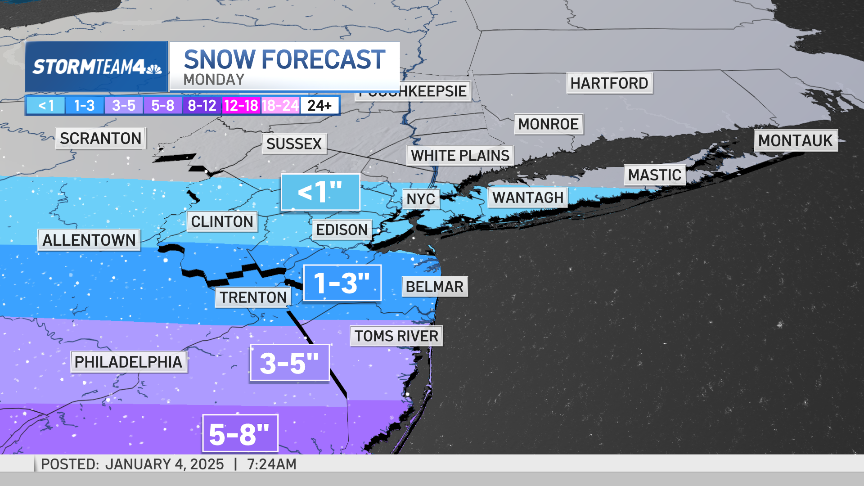Weeks after charging a Long Island architect in a string of killings known as the Gilgo Beach murders, prosecutors said Tuesday that they've begun providing his lawyer with reams of evidence including autopsy findings, DNA reports and crime scene photos.
Suffolk County prosecutors said at a brief court hearing that they've given Rex Heuermann’s lawyer at least 8 terabytes of material — equivalent to about 2,500 pages of records, along with about 100 hours of surveillance video recorded outside Heuermann's home and office prior to his July 13 arrest.
District Attorney Ray Tierney said that's a fraction of the evidence amassed since the bodies of four women were found buried along a remote beach highway in 2010 and 2011. More evidence will be turned over on a rolling basis, he said. This kind of evidence sharing, called discovery, is routine in criminal cases and is intended to help ensure a fair trial.
“You’re talking about 13 years of investigation," Tierney said. "It’s a massive amount of material.”
Get Tri-state area news delivered to your inbox.> Sign up for NBC New York's News Headlines newsletter.
Heuermann, 59, is charged with killing Melissa Barthelemy, Megan Waterman and Amber Lynn Costello, who disappeared over a 14-month span prior to the discovery of their bodies.
Prosecutors say Heuermann is also the prime suspect in the death of a fourth woman, Maureen Brainard-Barnes, who vanished in 2007. Her remains were found in the same quarter-mile stretch of Ocean Parkway as the other women, across a bay from the town where Heuermann grew up and lived for decades in his childhood home.
Heuermann did not speak at the hearing, which began about a half-hour late as prosecutors met his lawyer and the judge, Timothy Mazzei, behind closed doors. Tierney said afterward that they had been discussing the logistics and timetable for turning over evidence.
News
Prosecutors and Heuermann’s lawyer, Michael Brown, also reached a confidentiality agreement that prohibits sharing copies of the evidence with the public. Some of the evidence includes sensitive photographs of the women’s remains as they were found, wrapped in burlap and buried in thick underbrush on a barrier island off Long Island’s southern coast.
Heuermann, wearing a charcoal sport coat and blue button-down shirt, was brought to court through an underground tunnel from the jail across the street, where he’s been held since his July 13 arrest. He pleaded not guilty at his first court appearance and was ordered jailed without the possibility of bail. His lawyer said Heuermann denied committing the crimes.
“The press has convicted my client without seeing a shred of evidence,” Brown told reporters after the hearing, suggesting that prosecutors "very well could have the wrong guy.”
Brown said he received the first wave of evidence before Tuesday’s hearing — five manila envelopes, each containing a 2 terabyte hard drive — and that he has yet to review any evidence collected in the investigation.
“Today was the first time I was handed any evidence in this case and it was in the form of terabytes," Brown said. "I can’t read terabytes with my hands or my eyes.”
Heuermann is due back in court on Sept. 27.
All of the women Heuermann is accused of killing were sex workers whose remains were discovered near each other. Investigators say they cracked the case with the help of sophisticated cell phone location data analysis, DNA evidence and an old tip about a vehicle seen parked outside the home of one of the victims.
Investigators spent nearly two weeks combing through Heuermann’s home in Massapequa Park, across a bay from where the remains were found, yielding yet more evidence that will eventually be turned over to his lawyer.
The search included digging up the yard, dismantling a porch and a greenhouse and removing many contents of the house for testing.
Robert Macedonio, an attorney for Heuermann’s wife, Asa Ellerup, said the home was essentially “destroyed” along the way, with investigators cutting through the bathtub, ripping up floors, and leaving cat litter strewn around the house.
Ellerup filed for divorce after her husband was arrested. She and her two adult children, who also live at the house, returned last week after bouncing between relatives’ homes and a rental car, where they were forced to spend multiple nights, according to the lawyer.
“These people are also innocent victims in this,” Macedonio added. “They’re the unknown victims because no one cares about them.”
An attorney for the adult children, Vess Mitev, said his clients were considering legal action against police for the “deplorable and roughshod handling of the investigation.”
___
Associated Press writer Jake Offenhartz contributed to this report.
___
This story has been corrected to reflect that Melissa Barthelemy disappeared in 2009, not 2010.



